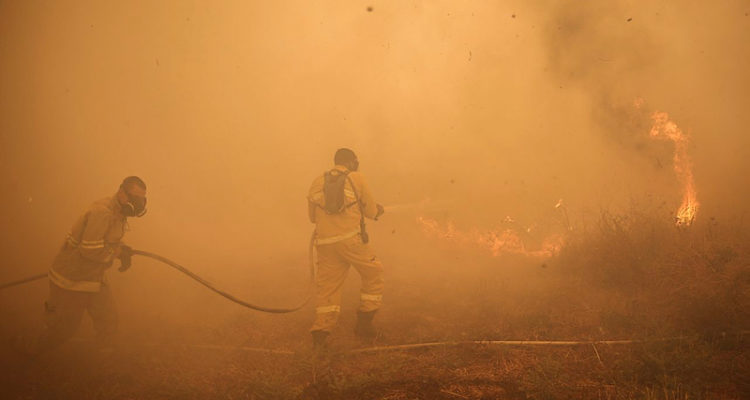Tuesday’s biggest blazes were in the Biriya forest near Safed, and the Keren Naftali forest in the Upper Galilee.
By Pesach Benson, TPS
After battling all night to get wildfires under control, Israeli firefighters were back in action against numerous smaller fires sparked by Hezbollah rocket fire on Tuesday. Crews worked in hot, dry temperatures reaching up to 34°.
“When you combine this with shells and bombs that explode, it starts all these wildfires. You don’t need much for that. Most of the damage was to green areas, and a few buildings, mostly warehouses,” Eddi Aharonoff, a spokesperson for the Fire Brigade said as he explained “fighting fire under fire” to The Press Service of Israel.
“We keep saying all the time that we are the only firefighters in the world that are fighting fire under fire,” Aharonoff told TPS-IL.
“We saw that on October 7, of course, when we lost 11 of our colleagues in the south. And now we are facing it in the north. There are entire areas where we cannot be in direct touch with the fire because they happen on the border and we might be hit by Hezbollah fire.”
He said that firefighting crews near the Lebanese and Gaza border carry rifles and pistols, along with protection equipment provided by the army and police.
“When you’re going to extinguish a fire, the temperature can get to 200 or 300 degrees. This can detonate the bullets. You’re actually carrying an explosive in your pocket while fighting the fire. That can be extremely dangerous for our people,” Aharonoff explained.
“On October 7, some of our officers had to fight on their way to the fire stations. There were a few places, like Sderot, where that actually happened,” he said.
But he said firefighters have so far not engaged in exchanges of fire while in the middle of battling a blaze.
Fire commanders “make sure when giving us our orders that we do not engage in a way that puts us at too much risk,” Aharonoff said.
‘It’s An Environmental Disaster’
Tuesday’s biggest blazes were in the Biriya forest near Safed, and the Keren Naftali forest in the Upper Galilee. The Ziv Medical Center in Safed said seven civilians helping firefighters at those forests were treated for minor injuries resulting from smoke inhalation.
Meanwhile, fires in the areas of Kiryat Shmona and the nearby agricultural communities of Kibbutz Menara and Kibbutz Kfar Giladi were declared under control.
For farmers already struggling with shortages of laborers and restricted access to fields and orchards, the fires were the latest problem.
“Last night we witnessed the largest fires since the beginning of the war, which resulted in a huge loss to agriculture and severe damage to the nature of the Galilee,” said Amit Cohen, a farmer and manager of Kibbutz Malkia’s orchards in the Upper Galilee.
“In Kibbutz Malkia alone, 30 dunams [7 acres] of apple orchards that were no longer harvested and 30 dunams of a wine vineyard and over 4,000 dunams [488 acres] burned [along with] pasture lands for cattle,” Cohen said.
“The sight of burnt fruit and vineyards on fire breaks our hearts but we must be strong, because we still have a long way to go, we will put out the fire and try to save the remaining fruit for the sake of the food security of the citizens of Israel.”
On Monday night, crews managed to keep the flames from reaching Metula, Kibbutz Amiad, Moshav Margaliot, Moshav Kahal, and on Mount Adir, among other locations.
In the Golan, firefighters battled blazes in the areas of Katzrin and Keren Naftali. Other fires sparked by shrapnel from the rockets broke out as far west as Shlomi and as far south as Kibbutz Mevo Hama by the Sea of Galilee.
Aharonoff told TPS-IL the worst hit places were “green areas” of forestry which had expanded due to winter rains. But the fires wiped out that growth.
“It’s an environmental disaster,” Aharonoff insisted. “We already lost around 4,000 acres of green land in the north. It will take dozens of years to repair this damage. This comes with the tragedy of thousands of people who were forced to evacuate.”
Around 60,000 Israelis living in northern communities were forced to evacuate in October when the Hezbollah terror organization began daily rocket and drone attacks.
Leaders of the Iran-backed terror group have said they will continue the attacks to prevent Israelis from returning to their homes. Since October 7, the Hezbollah attacks have killed 10 civilians and 14 soldiers.
Israeli officials have been calling for Hezbollah to be disarmed and removed from Southern Lebanon in accordance with UN Security Council resolution 1701, which ended the 2006 Second Lebanon War.




